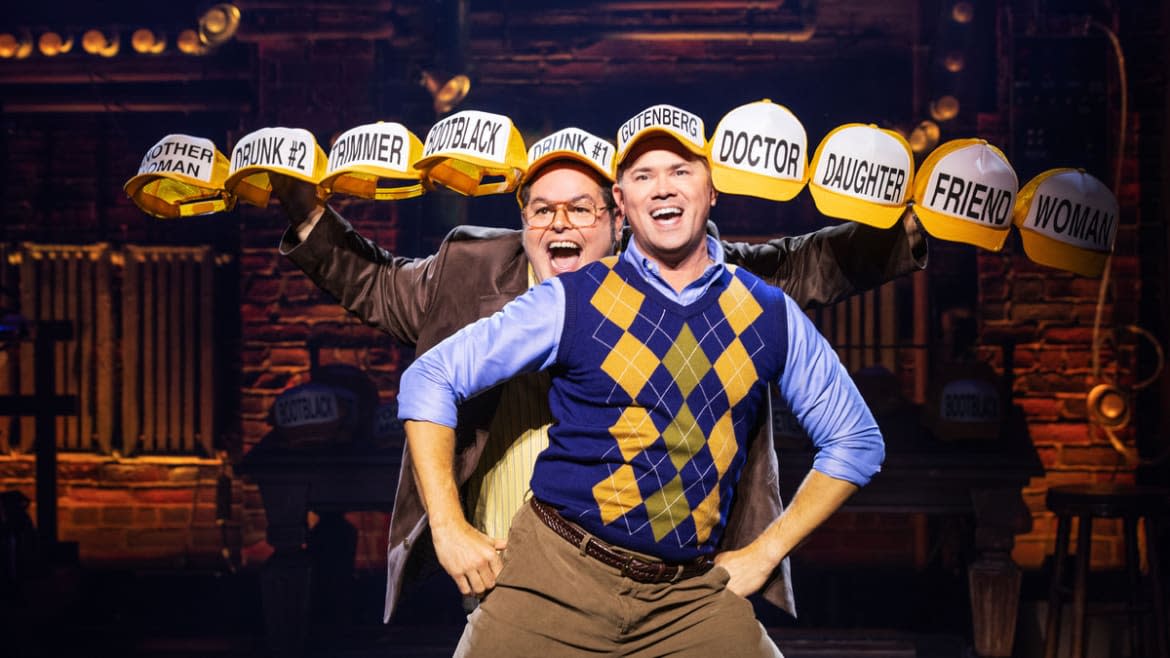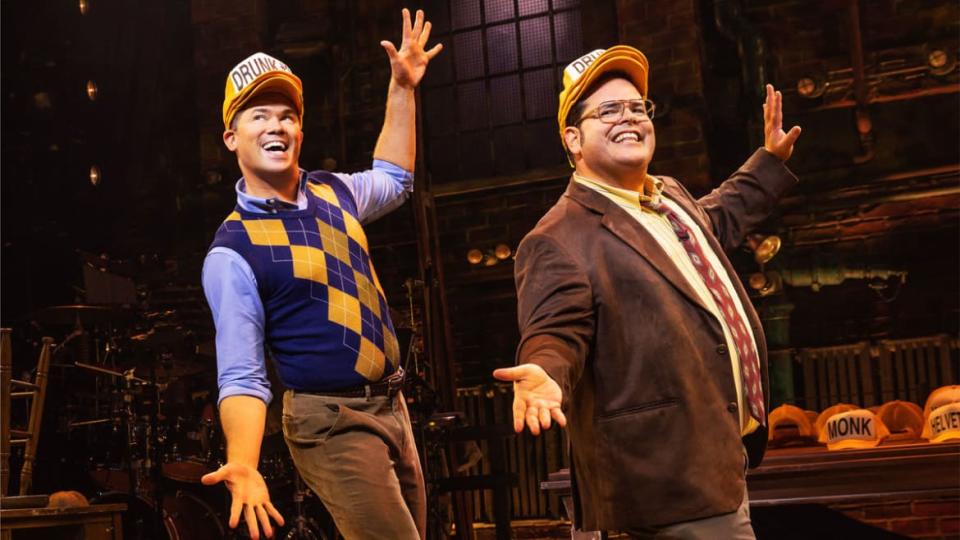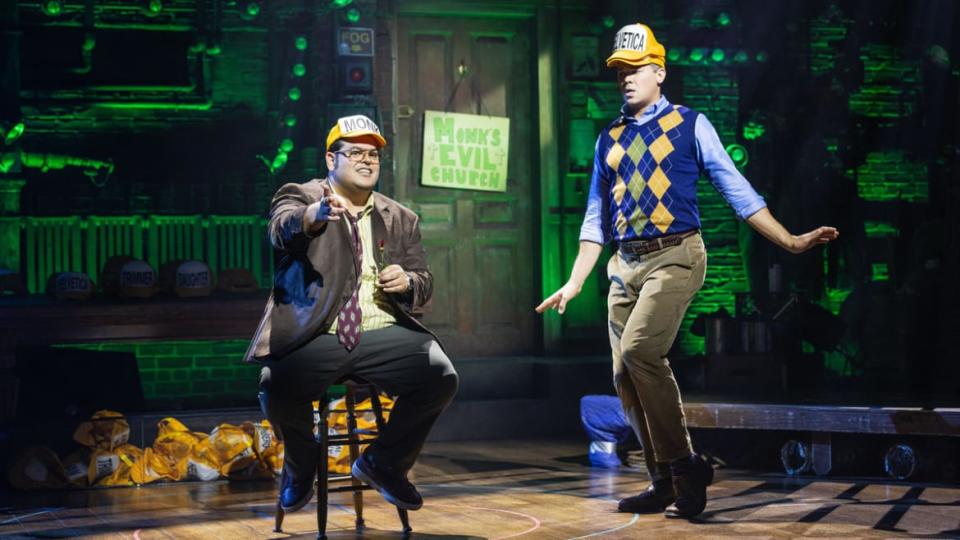Review: ‘Gutenberg! The Musical!’ on Broadway Is Extremely, Deliciously Silly

- Oops!Something went wrong.Please try again later.
- Oops!Something went wrong.Please try again later.
- Oops!Something went wrong.Please try again later.
It feels strange, in a week of such tragedy, violence, and gravity, to wholeheartedly recommend the opening of something as deliciously silly as Gutenberg! The Musical! on Broadway (James Earl Jones Theatre, through Jan. 28, 2024). But, if you feel the need to laugh and let go, you can trust Andrew Rannells and Josh Gad, formerly stars of The Book of Mormon, to be your expert facilitators.
Rannells plays Doug and Gad plays Bud, two theater-makers staging a production of their musical—Doug responsible for the book, Bud the music—about the famous inventor of the printing press, for the benefit of Broadway producers they know, or imagine, to be in the room among us. Broadway, as Bud says excitedly, is “our nation’s capital.”
Andrew Rannells: How I Stood Up to Broadway Sexual Harassment
Gutenberg!—with fabulous book, music, and lyrics by Scott Brown and Anthony King—is the best twofer. We get to see both the ridiculous musical that Bud and Doug dream up about Gutenberg and his invention in defiance of all available facts, as well as them both stepping outside of character and show to reveal themselves as musical obsessives. It’s a gleeful riot, right from the outset where Bud notes that we’re on the “weird side” of Seventh Avenue, between Sixth and Seventh, rather than the main bustling theater avenues between Seventh and Eighth.
Still, the men say, think of the wonderful productions that have played here: Captain Applejack, Nic Nax of 1926, Make Way For Lucia, The Bishop Misbehaves, I Killed The Count, and “of course, The Respectful Prostitute.”
Doug: “It turns out Broadway theaters are a lot like tandem bicycles—you can rent them.”
Bud: “For a lot of money.”
Doug: “So much.”
The men have financially benefited from the death of Bud’s uncle, “who loved hang-gliding, and then recently stopped hang-gliding.”
“It was very quick and he didn’t suffer. Which is exactly how I hope all of you die,” says Doug.
Not content with telling us the story, the men prance from side to side signal their extremely generous lifting of the veil of the theater-making process. In snappy mini-masterclasses, we learn what is historical fiction, for example. Bud: “It’s fiction... that’s true.” To demonstrate imagination, Bud walks in place. Doug asks where he’s going. “Nowhere Doug. I’m on a turntable,” Bud says. We are at a reading of a musical, we learn, but that does not mean we get copies of the musical to read.

Andrew Rannells, left, and Josh Gad in "Gutenberg! The Musical!"
Under Alex Timbers’ excellent direction, Rannells and Gad (with cherubic boyhood pictures as their Playbill photos) are great pacers of jokes, as well as tellers of them. They also have a lovely comic chemistry and complementary energies. One minute they are still, chatting to us; the next they are bounding around the stage, giving their all to their absurd production. Charismatic chameleons, they switch between fictional characters—played for kind-of-real, but also played for those imaginary Broadway producers—and jaded theater insiders with breezy ease.
Squashed finances mean that only Bud and Doug will play all the roles. And to know who they are playing they have an array of hats, to signify the names of other characters and character types. “But only for tonight. In an actual production we would never cast a straight white man to play a woman…Representation matters.”
The men are parodying theater’s awareness and falling short when it comes to representation, and—knowing they can sell their play harder if they shoehorn an issue into it, even if it has nothing to do with their subject matter (“Like racism. Homophobia. Or a man with half a face”)—they elect to make antisemitism central to their show. Some lines around this theme have been cut, given the events of recent days, though the show is not mocking, or making light of antisemitism—but rather theater practitioners’ desperation to make their shows in some way relevant.
The show is brimming with daffy comedy—like the repeated scene-setting phrase, “The roof is made of dirty thatch,” and the heavy underline that in the impoverished town of Schlimmer where Gutenberg lives no-one can read, and everybody must constantly say they cannot read to underscore how welcome Gutenberg’s printing press will be. (In German, “schlimmer” means worse.) In its embracing irreverence, and willingness to punch up and down at any target, the show shares a fundamental, very positive characteristic with The Book of Mormon that made both Rannells and Gad famous.
In the musical, Gutenberg (imagined as a kind of unbearably smug and entitled tech bro) initially owns a wine press, ably overseen by his assistant Helvetica, who nurses a secret, burning passion for him. His enemy, although he doesn’t know it is the evil Monk, who wants to crush the possibility of learning and literacy.

Josh Gad, left, and Andrew Rannells in "Gutenberg! The Musical!"
Out of nowhere, a song about biscuits erupts, which, we are told, is a “charm song,” which “gives the audience a break from watching the stuff they actually care about,” and also allows the opportunity of getting “a really famous person to play a really tiny part.” (The men have their eyes on Timothée Chalamet to play the role of Young Monk, Monk’s hapless henchman.) Soon enough it is time for the end-of-act one number, traditionally Bud says, “a soaring anthem that tween girls will eventually struggle to sing in the shower.”
History is extremely malleable/non-existent in the show, especially when Helvetica destroys the printing press after being goaded into jealousy by Monk. At the start of act two, the men open up—comically and also a little seriously—about who they are. If the play has a serious point, it is emphasized here: Musical theater is a passion, a venerable one, no matter how mad it drives its devotees to mount and produce it.
Doug is still sure their Stephen King! The Musical! could work, he insists. Their second show was a prequel to Phantom of the Opera. “How did he get that boat down there?!,” Bud says, mordantly and correctly noting of the current climate, “If your new musical isn’t already a movie or a book or a fairy tale told from the lady’s point-of-view, people will not sell their cars to see it.”
All this insider-jokery is balanced by song and dance numbers that look spectacular (especially aided by Scott Pask’s clever stage design and Jeff Croiter’s lighting), just as they seek to emphasize the men’s own amateurism, just as when they form a chorus line—with many hats and a clothes-line.
The show must go on; and Bud and Doug, for all their ridiculousness, want to put on the damn show. Doug’s mom had told him his passion was not a job. “You gotta put food on the table and you can’t eat dreams!” He killed her, he notes, because he chose to do exactly that, and by not being a doctor could not save her from lupus.
Bud says: “Oh Doug. That’s not your fault, that’s America’s fault. America killed your mom.”
“Thanks, Bud,” says Doug.
As more absurdities and big songs lead to a finale in their crazed fictional musical, both men say it is the most important night of their lives—and they mean it. The musical’s serious message hovers into view again: “We all want to eat dreams don’t we?” Doug says. “Well we’re here to tell you, my mom was wrong. You can eat dreams.” To underline this, the audience sings that sentiment back to the men on stage who more than earn an extremely happy ending denied to their version of poor Gutenberg and Helvetica. You’ll head into the night smiling widely, thankful for musical theater—and all-round silliness.
The Refuge Plays
The Refuge Plays (Roundabout at Laura Pels Theatre, to Nov. 12) clocks in at just over three hours, with two intermissions, and is the story of three generations we see inhabit a house in the woods of Southern Illinois, and particularly its primary inhabiter, Early (Nicole Ari Parker).
The story ambles and rambles, and certain elements echo down the years, as we watch a mysterious trove of bitterness, love, loyalty, mystery, ghosts, and secrets wrap and unwrap themselves on a stage that becomes barer the further back in time we go. It is not storytelling without purpose, but it can feel without focus. What engrosses are the performances of the 10-strong company, which are all—uniformly—excellent, sharp, witty, moving, and insightful. Time does not melt away exactly over the three hours, but you leave intrigued by a history that stays teasingly out of our grasp.
Get the Daily Beast's biggest scoops and scandals delivered right to your inbox. Sign up now.
Stay informed and gain unlimited access to the Daily Beast's unmatched reporting. Subscribe now.

